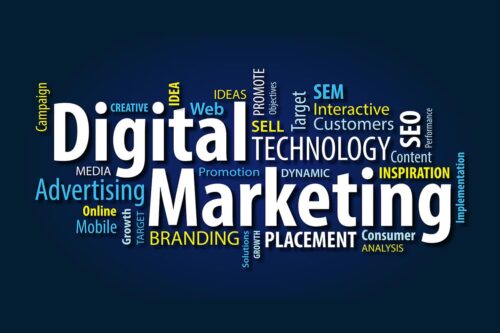What is Digital Marketing?
Digital marketing is a strategic approach that utilizes digital channels to promote products, services, or brands. It leverages online platforms, technologies, and tactics to reach and engage target audiences. Unlike traditional marketing, digital marketing offers real-time data and analytics, allowing for more precise targeting and measurement of results.
How Does Digital Marketing Work?
Digital marketing involves a multifaceted approach that combines various strategies and tactics. Key components include:
- Website Optimization: Ensuring your website is user-friendly, visually appealing, and optimized for search engines.
- Search Engine Optimization (SEO): Improving your website’s visibility in search engine results pages (SERPs) through organic techniques.
- Pay-Per-Click (PPC) Advertising: Running paid ads on search engines and other platforms to reach a wider audience.
- Content Marketing: Creating and distributing valuable content to attract and engage your target audience.
- Social Media Marketing: Utilizing social media platforms to build brand awareness, engage with customers, and drive traffic.
- Email Marketing: Sending targeted email campaigns to nurture leads and build customer relationships.
- Mobile Marketing: Optimizing your marketing efforts for mobile devices to reach a growing audience.
Types of Digital Marketing Channels
- Search Engine Marketing (SEM): Includes both SEO and PPC.
- Social Media Marketing: Platforms like Facebook, Instagram, Twitter, LinkedIn, and TikTok.
- Content Marketing: Blogs, articles, infographics, videos, and podcasts.
- Email Marketing: Newsletters, promotional emails, and automated campaigns.
- Pay-Per-Click (PPC) Advertising: Ads on search engines, social media, and display networks.
- Affiliate Marketing: Partnerships with other businesses to promote products or services.
- Video Marketing: YouTube, Vimeo, and social media platforms.
- Influencer Marketing: Collaborating with influencers to reach their audience.
Key Performance Indicators (KPIs) in Digital Marketing
To measure the effectiveness of digital marketing campaigns, marketers track key performance indicators (KPIs). Common KPIs include:
- Website Traffic: Number of visitors to your website.
- Conversion Rate: Percentage of website visitors who take a desired action (e.g., making a purchase).
- Social Media Engagement: Likes, shares, comments, and followers.
- Email Open Rate: Percentage of recipients who open your emails.
- Click-Through Rate (CTR): Percentage of people who click on your ads or links.
- Return on Investment (ROI): The profit generated from your marketing efforts.
Challenges in Digital Marketing
- Rapid Evolution: Keeping up with the latest trends and technologies.
- Data Overload: Analyzing and making sense of vast amounts of data.
- Algorithm Updates: Adapting to changes in search engine algorithms and social media platforms.
- Increasing Competition: Standing out in a crowded digital landscape.
- Privacy Concerns: Navigating data privacy regulations and consumer concerns.
The Future of Digital Marketing
Digital marketing continues to evolve, driven by advancements in technology, changing consumer behavior, and emerging trends. Artificial intelligence, augmented reality, and voice search are just a few examples of technologies that are shaping the future of digital marketing.
By understanding the fundamentals of digital marketing and staying updated on industry trends, businesses can effectively reach their target audience, drive engagement, and achieve their marketing goals




